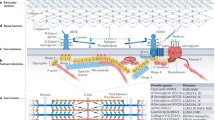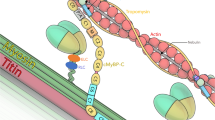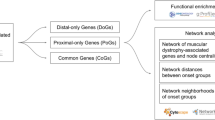Abstract
PROTEINS may exist in different molecular forms possessing the same enzymatic activity and which have been called isoenzymes1 or isozymes2. Lactate dehydrogenase has been extensively studied and appears to consist of five isoenzymes, each of which is a tetrameric association of two sub-units, M and H. It has been shown that the synthesis of either sub-unit may be altered in response to hormonal, environmental or neural changes3. Evidence has also been presented which suggests that the synthesis of the two sub-units is controlled by two separate genes4.
This is a preview of subscription content, access via your institution
Access options
Subscribe to this journal
Receive 51 print issues and online access
$199.00 per year
only $3.90 per issue
Buy this article
- Purchase on Springer Link
- Instant access to full article PDF
Prices may be subject to local taxes which are calculated during checkout
Similar content being viewed by others
References
Webb, E. C., Nature, 203, 821 (1964).
Markert, C. L., and Møller, F., Proc. U.S. Nat. Acad. Sci., 45, 753 (1959).
Dawson, D. M., Goodfriend, T. L., and Kaplan, N. O., Science, 143, 929 (1964).
Shaw, C. R., and Barto, E., Proc. U.S. Nat. Acad. Sci., 50, 211 (1963).
Vesell, E. S., Ann. N.Y. Acad. Sci., 94, 877 (1961).
Kar, C. N., and Pearson, C. M., Proc. U.S. Nat. Acad. Sci., 50, 995 (1963).
Van Wijhe, M., Blanchaer, M. C., and St. George-Stubbs, S., J. Histochem. Cytochem., 12, 608 (1964).
Emery, A. E. H., Nature, 201, 1044 (1964).
Dreyfus, J. C., Demos, J., Schapira, F., and Schapira, G., C.R. Acad. Sci., Paris, 254, 4384 (1962).
Pearson, C. M., Amer. J. Med., 35, 632 (1963).
Smithies, O., Biochem. J., 71, 585 (1959).
Fine, I. H., and Costello, L. A., Methods in Enzymology, edit. by Colowick, S. P., and Kaplan, N. O., 6, 958 (Academic Press, New York, 1963).
Katz, A. M., and Kalow, W., Canad. J. Biochem., 43, 1653 (1965).
Pennington, R. J., Proc. Assoc. Clin. Biochem., 2, 17 (1962).
Weinstock, I. M., Epstein, S., and Milhorat, A. T., Proc. Soc. Exp. Biol. and Med., 99, 272 (1958).
Tappel, A. L., Zalkin, H., Caldwell, K. A., Desai, I. D., and Shibko, S., Arch. Biochem. Biophys., 96, 340 (1962).
Hajek, I., Gutmann, E., and Syrovy, I., Physiol. Bohemoslov., 13, 32 (1964).
Dubowitz, V., Res. in Muscular Dystrophy, Proc. Second Symp., London, 1963, 34 (J. B. Lippincott Co., Philadelphia, 1963).
Author information
Authors and Affiliations
Rights and permissions
About this article
Cite this article
KATZ, A., KALOW, W. Abnormal Isoenzyme Patterns in Human Myopathies. Nature 209, 1349–1350 (1966). https://doi.org/10.1038/2091349b0
Issue Date:
DOI: https://doi.org/10.1038/2091349b0
This article is cited by
-
Trophic influences of the nervous system: Their biochemical basis and disturbance in skeletal muscle
Neuroscience and Behavioral Physiology (1973)
-
Vergleichende elektrophoretische Untersuchungen �ber Muskelproteine bei normalem, neurogen atrophischem un myopathisch ver�ndertem Skeletmuskel
Klinische Wochenschrift (1970)
Comments
By submitting a comment you agree to abide by our Terms and Community Guidelines. If you find something abusive or that does not comply with our terms or guidelines please flag it as inappropriate.



